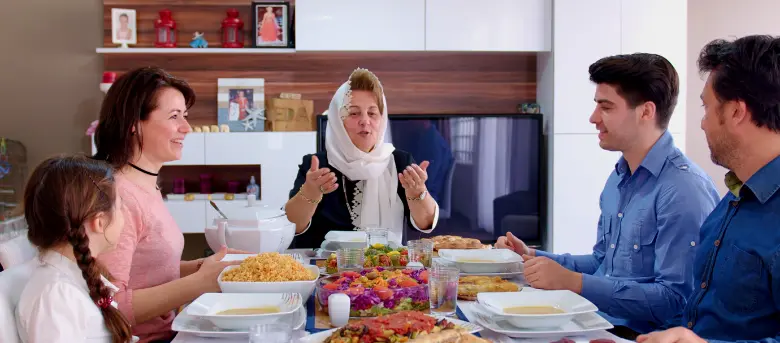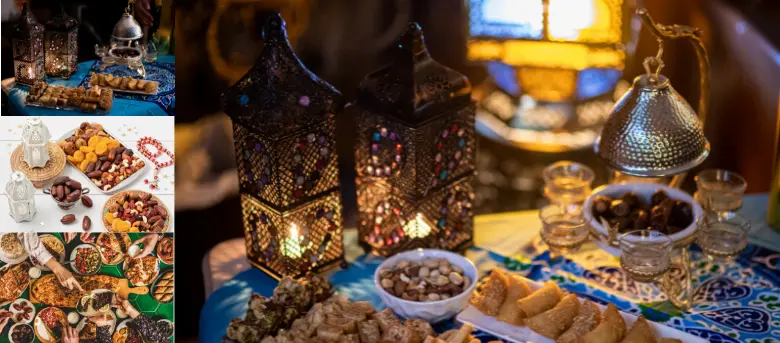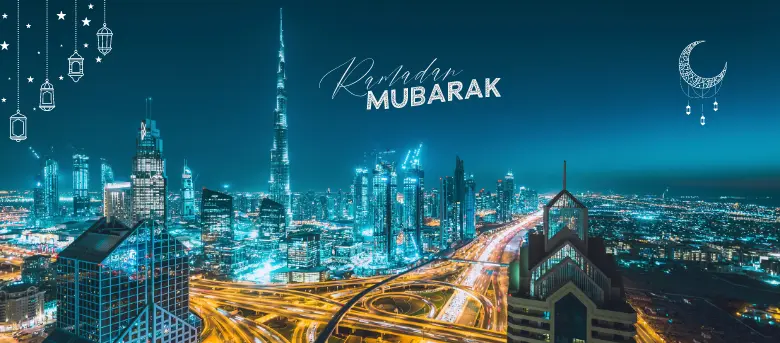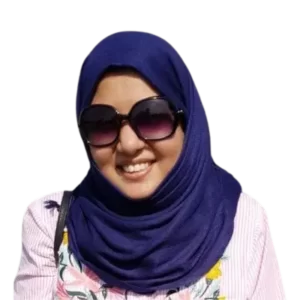In Dubai, UAE, Ramadan is a time of great importance and is celebrated with many cultural and traditional events. The holy month is observed uniquely and festively, with locals and expats alike experiencing a sense of unity and spiritual reflection. Ramadan in Dubai is a month of charity, compassion, and community, where people come together to share the blessings of the season.
Ramadan dates change yearly, as the Islamic calendar is based on the lunar cycle and moon sightings. In 2024, Ramadan in Dubai, UAE is expected to begin on the evening of Sunday, March 10, 2024, and conclude on April 8, 2024. During this time, visitors can expect to see a significant change in the city’s atmosphere, with shorter working hours, adjusted schedules for public transportation, and many cultural events and activities taking place. It is a time when the city comes alive with vibrant colours, fragrant aromas, and joyful celebrations.
Ramadan Explained for Expats
Ramadan is the ninth month of the Islamic calendar, observed by Muslims around the world. It is considered the most sacred month in the Islamic calendar, and it commemorates the time when the first verses of the Quran were revealed to the Prophet Muhammad. Ramadan is observed by fasting from dawn until sunset, abstaining from food, drink, smoking, and other physical needs.
Fasting during this month is one of the Five Pillars of Islam and is an essential part of the month. Fasting hours begin at dawn and end at dusk. People abstain from eating to increase their awareness of Allah and to become closer to him. The purpose of this month-long practice is to enhance one’s spiritual connection with Allah, increase self-discipline, and practice empathy for those in need.
Why Do Muslims Fast During the Month of Ramadan?
There are several reasons why Muslims fast during Ramadan. Firstly, fasting is considered one of the Five Pillars of Islam, which are the basic religious obligations that are mandatory for all Muslims. Fasting is a way to demonstrate devotion to Allah and commitment to the Islamic faith.
Secondly, fasting is a way to develop self-discipline and self-control. By abstaining from food and drink during the day, individuals learn to control their desires and focus on spiritual matters. Fasting is a way to purify the mind and body and become more mindful of actions and behaviour.
Thirdly, fasting is a way for individuals to empathize with those who are less fortunate. By experiencing hunger and thirst, individuals develop a greater appreciation for the blessings in their lives, and they become more compassionate towards those who are struggling with poverty and hunger.
Fourthly, fasting during Ramadan is a way to strengthen family and community ties. Families often gather with their friends for iftar, the evening meal that breaks the fast. This is a time for sharing food, offering prayers, and spending time together. Fasting during Ramadan is an opportunity to come together and strengthen their bonds with one another.
The Most Common Observances of Ramadan In Dubai UAE
Ramadan is a time of heightened spiritual focus and devotion for Muslims around the world. The holy month is marked by a variety of observances and rituals, which are intended to deepen one’s connection with Allah and cultivate inner peace and strength. Here are some of the most common observances during Ramadan:
- Fasting: Fasting during Ramadan is one of the most important observances. From dawn until sunset, individuals abstain from food, drink, and other physical needs as an act of worship and self-discipline.
- Prayer: During Ramadan, people who follow Islam are encouraged to pray more frequently, both individually and in congregational settings. Many mosques arrange additional prayer services during the month, such as Tarawih prayers that are performed after the Isha prayer.
- Quranic recitation: Muslims are encouraged to read and reflect on the Quran during Ramadan. Many individuals aim to read the entire Quran individually or in groups during the month.
- Charity: Giving to charity is an essential aspect of Ramadan, as it is a time to share blessings with others and to help those in need. individuals are encouraged to give generously to charity during the month through individual donations or collective efforts.
- Breaking fast: People traditionally break their fast at sunset with dates. Many individuals gather with family and friends for iftar, it is a time for sharing food, offering prayers, and spending time together.
- Communal meals: Individuals often gather for communal meals throughout the month, either at the mosque or in private homes. These meals are an opportunity to strengthen community ties and to share the blessings of the month with others.
Explanation of Iftar and Suhoor Meals

Iftar is the meal that breaks the fast after sunset. This meal is often a social event, with families and friends gathering to share food and conversation. Iftar meals typically start with dates and water, followed by a variety of dishes that vary by region and culture.
Suhoor is the pre-dawn meal that is eaten before beginning their fast for the day. This meal is important as it provides the energy needed for the day ahead. Suhoor meals are typically light, consisting of foods that are easy to digest and provide sustained energy throughout the day.
In Dubai, many hotels and restaurants offer special iftar and suhoor buffets during Ramadan. These buffets offer a wide variety of traditional and modern dishes, making them a great way to experience local cuisine and hospitality.
How Can Non-Muslims Get Involved with Ramadan?
Ramadan is a time of cultural and spiritual significance for Muslims, but it also provides a unique opportunity for non-Muslims to learn about and engage with the local community. Here are some ways that non-Muslims can participate in Ramadan and experience its traditions and customs:
- Attend Iftar meals: Iftar is the meal that Muslims break their fast with at sunset, and it is often a communal event. Many hotels and restaurants offer Iftar buffets that are open to everyone, and attending these meals can be a great way to experience the local cuisine and hospitality while meeting new people.
- Learn about Ramadan traditions and customs: Dubai has a rich cultural heritage, and Ramadan provides a unique opportunity to learn about its customs and traditions. Non-Muslims can attend cultural events like the Ramadan Nights by Dubai Culture and Arts Authority to experience live performances, exhibitions, and workshops.
- Exchange Ramadan greetings: Non-Muslims can show their respect and solidarity by exchanging Ramadan greetings with their Muslim friends and colleagues. ‘Ramadan Kareem’ is the most commonly used greeting, with the word ‘Kareem’ meaning ‘generous.’
- Try fasting for a day: Fasting is one of the key observances during Ramadan, and non-Muslims can try it for a day or two to gain a better understanding of what Muslims experience during the holy month. Breaking the fast with Muslim friends or colleagues can be a great bonding experience.
- Give back to the community: Ramadan is a time for charity and giving back to the less fortunate, and non-Muslims can volunteer their time and resources to help those in need. There are many volunteer opportunities during Ramadan, such as distributing food to the needy, helping out at charity events, and donating to local organizations that support the community.
Spread Joy During Ramadan with These Must-Know Greetings and Phrases
Ramadan is a time of reflection, gratitude, and celebration for Muslims worldwide. If you’re a non-Muslim visiting or living in a Muslim-majority country during Ramadan, it’s important to be respectful of the customs and traditions of the holy month. One way to show respect and engage with the community is by learning and using some useful Ramadan greetings and phrases.
Here are some phrases to learn and say during Ramadan:
- Ramadan Kareem: This is a common greeting used during Ramadan that translates to “Happy/generous Ramadan.” It’s a way to express good wishes to friends and strangers alike.
- Ramadan Mubarak: This greeting means “Blessed Ramadan” and is another way to wish someone well during the holy month.
- Taqabbala Allah: This phrase means “May God accept your fasting/prayers” and is a way to acknowledge the efforts of those who are observing Ramadan.
- Mubarak alaikum shahr Ramadan: This phrase means “May the month of Ramadan be a blessing for you” and is another way to express good wishes for the holy month.
- Enta sayem?/Enti sayma?: If you’re curious whether someone is fasting, you can ask “Enta sayem?” (for males) or “Enti sayma?” (for females). These phrases mean “Are you fasting?”
- Anaa saa’im: If you’re fasting and someone asks you if you’re fasting, you can say “Anaa saa’im.” This means “I am fasting.”
- Eid Mubarak: Finally, this phrase means “Blessed Eid” and is a common greeting used during Eid al-Fitr to wish others well.
Cultural Events and Activities During the Holy Month Of Ramadan
Ramadan is not only a time for spiritual reflection and worship, but it is also a time for community gatherings, cultural events, and festivities. In UAE, there are plenty of activities to engage in during Ramadan that offer a unique cultural experience. Here are some of the events and activities you can look forward to during Ramadan:
A. Overview of Ramadan Night Markets, Cultural Events, and Exhibitions
Ramadan night markets are a must-visit attraction during the month of Ramadan. These markets are usually set up in the evening and offer a variety of local and international cuisine, as well as shopping and entertainment options. Visitors can explore the markets and sample various traditional Emirati dishes, including Arabic coffee, dates, and sweets.
Another popular event during Ramadan is the Ramadan tent. These tents are set up in hotels and other venues and offer iftar and suhoor meals, live entertainment, and traditional Emirati hospitality. These tents provide an opportunity to experience the warmth and generosity of Emirati culture and to have breakfast with locals and visitors from around the world.
Dubai also hosts a variety of cultural events and exhibitions during Ramadan. These events showcase Emirati culture and traditions, including art exhibitions, cultural performances, and heritage tours. These events provide an opportunity to learn about Emirati culture and history and to engage with local communities.
B. Ideas for Experiencing the Local Cuisine and Hospitality During Ramadan

Food is an important aspect of Ramadan, and the emirates offer plenty of opportunities to experience the local cuisine and hospitality. Here are some ideas for experiencing the local cuisine and hospitality during Ramadan:
Visit a traditional Emirati restaurant: Dubai is home to many traditional Emirati restaurants that serve authentic local cuisine. These restaurants offer an opportunity to experience the flavours and aromas of Emirati cuisine, including popular dishes like machboos, thareed, and luqaimat.
Attend an iftar or suhoor meal: Iftar and suhoor meals are an important part of Ramadan, and attending these meals is a great way to experience the local hospitality. Many hotels and restaurants in UAE offer iftar and suhoor meals during Ramadan, and these meals provide an opportunity to break fast with locals and visitors from around the world.
Visit a local market: Local markets are a great place to experience the sights, sounds, and smells of Emirati culture. Dubai’s spice and gold souks are particularly popular among visitors and offer an opportunity to explore the local markets and purchase traditional Emirati products and souvenirs.
Things To Be Mindful of During Ramadan in the UAE
Dubai is a diverse and multicultural city that welcomes people from all over the world. However, during Ramadan, it is important to be mindful of local customs and traditions. Here are some things to keep in mind during Ramadan:
- Dress modestly: It is important to dress modestly during Ramadan, especially in public places. This means covering your shoulders and knees and avoiding revealing clothing.
- Be mindful of public behaviour: Ramadan is a time for spiritual reflection and contemplation, so it’s important to be respectful of those who are fasting. Avoid eating, drinking, or smoking in public during daylight hours. Loud music or excessive noise should also be avoided.
- Adjust your work schedule: During Ramadan, work hours are often shortened, with many businesses closing early. It is important to check with your employer to confirm your work schedule and adjust accordingly.
- Plan ahead for meals: Most restaurants and cafes in Dubai will remain open during Ramadan, but some may have limited hours or be closed during the day. It’s important to plan ahead and check opening hours before going out for meals.
- Be mindful of transportation: Public transportation may have limited schedules during Ramadan, so it’s important to plan your travel accordingly. Taxis and ride-sharing services are still available, but it’s best to book in advance during peak hours.
- Be respectful when attending iftar meals: If you are invited to an iftar meal, it is important to be respectful of the customs and traditions of the host. Dress modestly and be mindful of your behaviour. Avoid eating or drinking until the host begins the meal.
- Learn about the local culture and traditions: Ramadan is an excellent time to learn about the local culture and traditions of the Emirates. Attend cultural events, visit historical sites, and talk to locals to gain a better understanding of the significance of Ramadan in the UAE.
The Do’s and Don’ts of Eating and Drinking in Public during Ramadan
Ramadan is a month of fasting, prayer, and reflection for Muslims around the world. For those living in Dubai, it’s important to be mindful of local customs and traditions during this time. One common question that arises is whether or not it’s permissible to eat or drink in public during Ramadan.
The short answer is no, it’s not allowed to eat or drink in public during daylight hours in Dubai during Ramadan. However, there are a few exceptions to this rule. Pregnant women, children, the elderly, and those with medical conditions are exempt from fasting, and they are allowed to eat and drink in public. However, it’s important to be discreet and respectful while doing so.
Here are some important do’s and don’ts to keep in mind regarding eating and drinking in public during Ramadan in Dubai:
Do’s:
- Eat and drink in the privacy of your home or in designated areas such as hotel restaurants that are closed off from public view.
- If you must eat or drink in public, be discreet and respectful. Try to find a secluded spot where you won’t be seen by others who are fasting.
- Avoid smoking in public during Ramadan, as this is also considered disrespectful.
- Be mindful of your Muslim colleagues and friends who are fasting, and refrain from eating or drinking in front of them.
Don’ts:
- Do not eat or drink in public during daylight hours in Dubai during Ramadan. This includes on the street, in parks, or on public transportation.
- Do not play loud music or engage in any behaviour that may be considered disrespectful or distracting to those who are fasting.
- Do not offer food or drink to your Muslim colleagues or friends during daylight hours, as this may be seen as insensitive.
Can Non-Muslim Expats Drink Alcohol During Ramadan in Dubai?
Yes, non-Muslim expats are allowed to drink alcohol during Ramadan in Dubai, but only in designated areas such as licensed hotels, bars, and restaurants that are not visible to the public. It is important to note that drinking in public places during the month of Ramadan is strictly prohibited, and violators can face legal consequences. It is also advisable to be respectful of the local culture and refrain from drinking in front of those who are fasting. Additionally, some bars and restaurants may choose to limit their alcohol service during Ramadan, so it is best to check with the establishment beforehand.
Are there any Special Rules or Regulations for Clothing During Ramadan in Dubai?
During Ramadan, visitors are advised to dress modestly and respect the local customs and traditions. While there are no strict dress codes in Dubai, it is recommended to avoid clothing that is too revealing or provocative, especially in public places or when visiting mosques. It is also advisable to dress conservatively when attending Iftar or Suhoor events. Both men and women should ensure that their clothing covers their shoulders and knees.
Final Thoughts on Ramadan in UAE For Non-Muslim Expats
Ramadan in the UAE is a unique cultural and spiritual experience that offers expats an opportunity to learn about and engage with the local community. It is a time of reflection, prayer, and giving that is observed by Muslims throughout the country.
As a non-Muslim expat, it is important to be respectful and mindful of local customs and traditions during Ramadan. By doing so, you can show your appreciation for the culture and contribute to a more harmonious and inclusive society.
Whether you are visiting the UAE during Ramadan or are a resident, there are many ways to enjoy and experience the month. Attend cultural events, visit night markets, and explore the local cuisine to get a taste of the unique traditions and customs of the country.
Additionally, be sure to educate yourself on the do’s and don’ts of eating, drinking, and smoking in public during daylight hours throughout the month of Ramadan. By respecting these rules, you can avoid offending the local community and show your respect for their beliefs.
Overall, Ramadan is a time of reflection, self-discipline, and giving. It is a chance for expats to learn more about the local culture and traditions, and to contribute to a more inclusive and respectful society.


